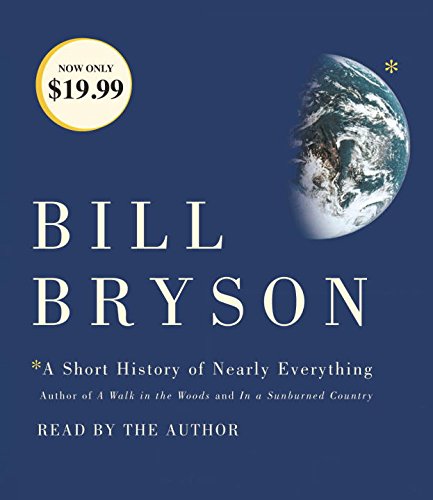
Bill Bryson is one of the world’s most beloved and bestselling writers. In A Short History of Nearly Everything, he takes his ultimate journey–into the most intriguing and consequential questions that science seeks to answer. It’s a dazzling quest, the intellectual odyssey of a lifetime, as this insatiably curious writer attempts to understand everything that has transpired from the Big Bang to the rise of civilization. Or, as the author puts it, “…how we went from there being nothing at all to there being something, and then how a little of that something turned into us, and also what happened in between and since.” This is, in short, a tall order.
To that end, Bill Bryson apprenticed himself to a host of the world’s most profound scientific minds, living and dead. His challenge is to take subjects like geology, chemisty, paleontology, astronomy, and particle physics and see if there isn’t some way to render them comprehensible to people, like himself, made bored (or scared) stiff of science by school. His interest is not simply to discover what we know but to find out how we know it. How do we know what is in the center of the earth, thousands of miles beneath the surface? How can we know the extent and the composition of the universe, or what a black hole is? How can we know where the continents were 600 million years ago? How did anyone ever figure these things out?
On his travels through space and time, Bill Bryson encounters a splendid gallery of the most fascinating, eccentric, competitive, and foolish personalities ever to ask a hard question. In their company, he undertakes a sometimes profound, sometimes funny, and always supremely clear and entertaining adventure in the realms of human knowledge, as only this superb writer can render it. Science has never been more involving, and the world we inhabit has never been fuller of wonder and delight.From primordial nothingness to this very moment, A Short History of Nearly Everything reports what happened and how humans figured it out. To accomplish this daunting literary task, Bill Bryson uses hundreds of sources, from popular science books to interviews with luminaries in various fields. His aim is to help people like him, who rejected stale school textbooks and dry explanations, to appreciate how we have used science to understand the smallest particles and the unimaginably vast expanses of space. With his distinctive prose style and wit, Bryson succeeds admirably. Though A Short History clocks in at a daunting 500-plus pages and covers the same material as every science book before it, it reads something like a particularly detailed novel (albeit without a plot). Each longish chapter is devoted to a topic like the age of our planet or how cells work, and these chapters are grouped into larger sections such as “The Size of the Earth” and “Life Itself.” Bryson chats with experts like Richard Fortey (author of Life and Trilobite) and these interviews are charming. But it’s when Bryson dives into some of science’s best and most embarrassing fights–Cope vs. Marsh, Conway Morris vs. Gould–that he finds literary gold. –Therese Littleton

Highly Entertaining with Easy Readability A very comprehensive overlook of the universe and our history in an entertaining manner. Easily readable for amateur and professional science buffs alike. The only minor problem is that some of the facts need updating with new findings since this was written in 2004 and scientific findings are coming at an ever increasing rate. I would highly recommend this book to anyone with even a passing interest in science as they will find it hard to put down once started.
Humanity’s bedtime story I’ve owned this book in three versions: big and illustrated, paperback (when I left the big one with my ex-wife) and Kindle (when I realised I never wanted to be unable to open this book). I’ve read it twice and I open it every now and then, on my phone or Paperwhite, sometimes to remind me of something I enjoy knowing and feel the bursting pride of being a participant in humanity’s great journey and sometimes to just escape the world outside and be soothed listening to the telling of a…
A most unusual but extremely interesting book! A friend of mine recommended this book knowing that I like science. I’m used to reading about the sciences in single topics. This book surprised me in the amount of effort the author took to go through book after book of different sciences, both old and new, and proceeded to connect the dots into several cohesive stories about our home, planet Earth, and its residents. The biggest surprise is how little we truly know about both and just how much luck was involved that both exist in their…